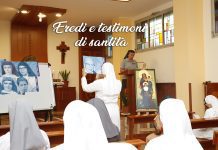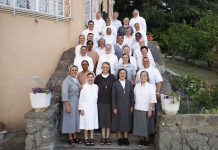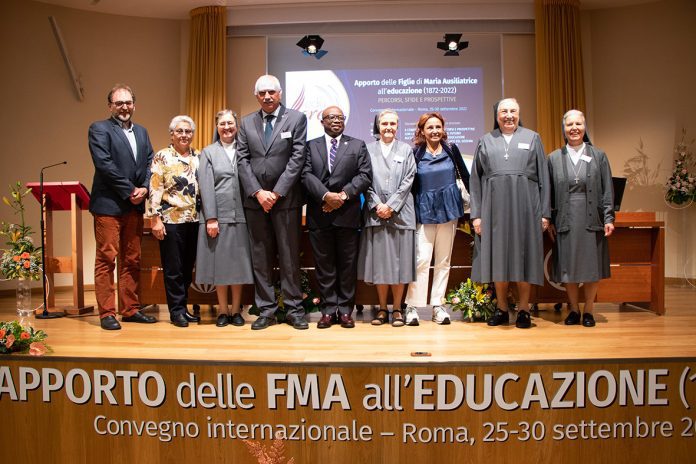Rome (Italy). On 25 September 2022,with the greetings of Mother Chiara Cazzuola, Superior General of the Institute of the Daughters of Mary Help of Christians, who welcomed the authorities, the 270 participants present in the theater hall of the Generalate, and the approximately 1300 registered online, the introductory session of the International Conference “Contribution of the FMA to Education (1872-2022) Paths, Challenges, and Perspectives” opened. It was organized by the Pontifical Faculty of Education “Auxilium” on the occasion of the 150th anniversary of the Institute’s foundation.
Among those present in the room were Mr. Jean Jude Piquant, Ambassador of Haiti to the Holy See, as well as Salesians of Don Bosco, FMA Educators, Past Pupils, and students of the Faculty, and scholars from different Countries of the world.
Before continuing with the greetings, Sr. Piera Ruffinatto, Principal of the “Auxilium” Faculty, presents Mother Chiara with a copy of the volume, “The FMA in the World (1872-2022). Education in Images”, edited by Sr. Grazia Loparco and Sr. Angela Marzorati, Responsible for the photographic documentation of the FMA Institute.
Paola Ilari, Councilor for educational policies of the III Municipality of Rome, the area of the capital where the Generalate is located, in her greeting highlights the precious work of the FMA in the area, as a presence characterized by an international dimension, given the particular conformation of the Headquarters of the International Institute.
Mother Yvonne Reungoat, Superior Emeritus of the FMA Institute, intervenes as President of the Union of Major Superiors of Italy (USMI), recognizes that in this complex ‘today’, the Salesian educational charism is a “driving force, creative, innovative, capable of bringing out the potential for good present in the life of young people, of all young people.” The 150th anniversary is a ‘springboard’ to continue dreaming big with optimistic realism, because every transformation process begins with education.
Mr. Reinhard Helserer, President of the Austrian non-profit organization Jugend Eine Welt, presents himself with a Sacher cake, a sign of celebration and gift to the assembly, arguing that “we are called to change, to fight to give visibility and dignity to young women” and therefore thanking the ‘Daughters‘ of Mary Help of Christians “because whoever educates a woman educates a people.”
Recalling the Global Educational Pact of Pope Francis, Maria Carmen Castillon, President of the FMA Past Pupils World Conference, asks a question, “How can we, as participants in this Congress, collaborate and participate fully in the challenges and confrontations present today and how should the future of education be now and in the future? Abraham Lincoln, former president of the United States, once said, ‘The best way to predict the future is to create it’.”
Mr. Antonio Boccia, World Coordinator of the Salesian Cooperators, through the metaphor of the tuning fork, encourages the FMA who called by the Lord, have begun to vibrate the note of the Salesian charism, to ‘tune’ their hearts, so that the same sound can ‘vibrate those of the young’ precisely because ‘education is a thing of the heart.’
In concluding, the messages sent by great personalities are read: the Rector Major of the Salesians of Don Bosco, Fr. Ángel Fernández Artime; Card. Angelo De Donatis, Vicar of the Holy Father for the Diocese of Rome; and Pope Francis, who invite the FMA to be ‘presence’ in the Salesian Family, in the local Church, and in the universal Church, called to be a traveling companion in the growth of courageous, sensitive, human men and women.
In the introductory talk of the Conference, Sr. Grazia Loparco, Professor of Church History, asks, “What is the specific contribution that the FMA Institute is called to offer starting from the preventive attitude that characterizes it, in dialogue with emerging challenges?” She reiterates that “the fundamental purpose of the Conference is to place ourselves in the epochal change with the contribution of Salesian feminine education.”
After having illustrated the aims and objectives, process and articulation, she concludes:
“The work site is open to contribute online to the achievement of common goals for those who promote peace with artisan tenacity, care about the renewal of society and believe that education is the key.”
The appointment for the participants is for the following day, September 26, during which they will delve into the works of the First Session – Historical path between data and experiences.
The texts of the greetings and messages, the introduction to the Conference, and all the other reports offered during these days are available on the Conference website, in the Materials Area.
Photos: Flickr FMA




















